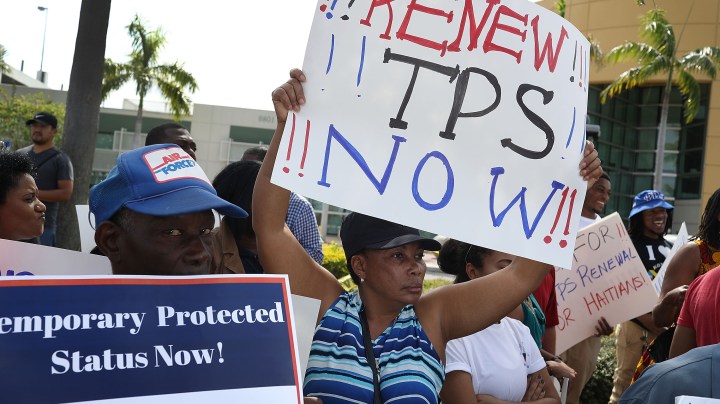Central Americans Express Fear After Temporary Protected Status Ends for Nicaraguans

People protest the possibility that the Trump administration may overturn the Temporary Protected Status for Haitians in front of the U.S. Citizenship and Immigration Services office. Photo by Joe Raedle/Getty Images News
As activists and immigrants assembled to fight for the protections of the United States’ sizable undocumented community, many held up signs asking the government to protect Temporary Protected Status (TPS), a program Congress started in 1990 that currently shields more than 300,000 people, who have fled natural disasters and war. In the days leading up to November 6, the hashtag #SaveTPS made its mark on the internet. The Department of Homeland Security had until Monday to decide whether it would extend the status for Nicaraguans Hondurans before it expired in January. On Monday, DHS ended the program for the about 2,500 Nicaraguans who depend on it and extended it until July 5 for Hondurans.
Elaine Duke, the acting secretary of homeland security, said the agency will continue reviewing whether it should renew the protection for Honduras, according to The New York Times. The Trump Administration said that in the time the temporary status has existed, conditions have improved in the beneficiaries’ home countries. But in many countries this is not true. About a month ago, Tropical Storm Nate brought devastating damage to Nicaragua, Honduras, and other Central American countries, which have also seen an exodus in recent years because of gang violence.
And in the time that they have lived in the United States, many TPS holders have carved out a life for themselves. Some have purchased homes and planted roots, and the end of the program means they may be separated from their loved ones and forced to return to a precarious situation.
Nicaraguans currently have until January 5, 2019 to get their affairs in order or try to adjust their status. But as Jose Gomez-Marquez pointed out through a series of tweets, this is no easy feat.
Along with Nicaragua, TPS also protects people from El Salvador, Haiti, Honduras, Nepal, Somalia, Sudan, South Sudan, Syria, and Yemen. With the end of the program for Nicaraguans and other deadlines looming, many are wondering if their country is next.